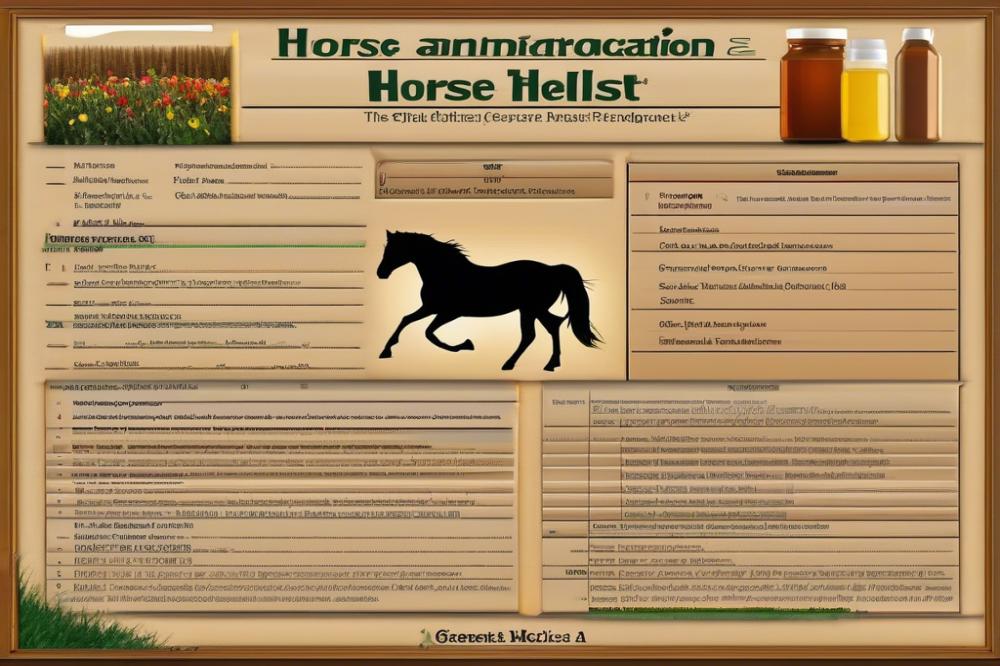Understanding Horse Medications
When we talk about horse care, one topic that usually comes up is the variety of treatments available for these majestic creatures. Just like humans, horses can experience a range of health issues that require medical attention. This is where medications come into play. These are not just random pills you might find in a horse pharmacy; they are carefully formulated solutions designed to address specific needs. From pain relief to antibiotics, there’s a whole world of equine treatment that can help keep your horse feeling its best.
Proper medication is crucial for maintaining horse health. Imagine if you went to the doctor and received a prescription for the wrong illness. Yikes! Horses rely heavily on their caregivers to recognize signs of discomfort or illness. When owners are informed about the right meds, it helps them make wise decisions to foster recovery and overall well-being. Just like a trusty steed doesn’t run well without good shoes, a horse’s health often depends on timely and appropriate treatment.
This article aims to provide you with an overview of vital medications used in equine care. You’ll find a handy medication list and learn about their purpose and how they work. Whether you’re curious about what treatments your new pony might need after buying a horse at auction or just wanting the best for your old partner in crime, this guide has your back. And let’s not forget those trending supplements to make your horse run faster! Life is full of surprises, and good health shouldn’t be one of them. So, let’s dive in!
Types of Horse Medications

When it comes to horse care, knowing the types of medications is essential for maintaining equine health. Different categories play distinct roles in keeping your horse healthy and happy. Let’s break down the main types you might find in a horse pharmacy.
Anti-inflammatories
These medications help reduce inflammation in horses. Whether it’s a sore tendon or a stubborn joint, anti-inflammatories can work wonders. They are often prescribed after an injury. You might hear terms like NSAIDs, which stands for non-steroidal anti-inflammatory drugs. Popular choices include phenylbutazone and flunixin. Always consult a vet before giving any medication, as proper dosage is key!
Antibiotics
Infections can be a real party crasher for equine health. Antibiotics literally come to the rescue! When a bacterial infection strikes, these medications help fight off the bad guys. Common scenarios include wounds or respiratory issues. Just remember, antibiotics won’t work against viruses, so don’t expect them to cure everything. Always follow your vet’s instructions when using these medications.
Pain Relievers
If your horse shows signs of discomfort, pain relievers can help. These medications can soothe that achy back or sprained ankle. Some pain relievers are similar to anti-inflammatories, but they can have different effects. You want your horse to be comfortable, after all. Make sure to observe your horse closely after giving any pain medication, so you know how it’s helping.
Sedatives
Sometimes, a little chill time is what your horse needs. Sedatives are often used for calming nervous horses during stressful situations, like vet visits or shoing. With just a small dose, your horse can relax and feel less anxious. Of course, you want to be careful and use sedatives only when necessary. Monitor your equine friend afterward to ensure they are back to their usual self.
Vaccinations
No medication list is complete without vaccinations. They serve as a vital part of equine treatment. Vaccines protect horses from diseases like West Nile virus, rabies, and tetanus. Keeping up with vaccinations is like putting on a protective armor against illness. It’s essential for your horse’s overall well-being as well as the health of the other animals around them.
Common Medications Used in Horses

When it comes to equine health, knowing the right medications is essential for every horse owner’s toolkit. Let’s dive into some of the most commonly used treatments, so you’ll feel prepared next time you visit the horse pharmacy.
NSAIDs: Phenylbutazone and Flunixin Meglumine
Non-steroidal anti-inflammatory drugs (NSAIDs) are common in horse care. Phenylbutazone, often called “bute,” is a go-to option for reducing pain and inflammation. Many trainers swear by its effectiveness—just don’t let your horse know it’s taking medicine; they might not appreciate the flavor!
Then you have Flunixin Meglumine, another NSAID that stands out. This medication is especially useful for colic pain or fever. Remember, both of these pain relievers can be a lifesaver but should be administered with care. Talk to your vet for guidance on dosages and timing.
Antibiotics: Procaine Penicillin and Sulfonamides
Infections? No thanks! Enter antibiotics. Procaine penicillin is a classic choice when it comes to treating bacterial infections in horses. It usually comes in an injectable form, and its effectiveness is well-known. It’s like a trusty shield for your horse’s immune system.
Another option includes sulfonamides, which are broad-spectrum antibiotics. They can help tackle various infections, giving your horse a fighting chance against those pesky germs. Always consult your vet before beginning any treatment plan to ensure proper care and equine treatment.
Sedatives: Acepromazine and Xylazine
Let’s face it; sometimes our equine friends just need to chill out. Acepromazine is a common sedative that helps calm anxious horses. Whether it’s a vet visit or a loud parade, a little Acepromazine can turn a drama queen into a sleepyhead.
Xylazine, on the other hand, offers a more profound sedative effect. It can be a game-changer for procedures that require a calmer horse. Always keep a good conversation going with your vet about how these medications can help in specific situations.
Vaccines: Equine Influenza and Tetanus
Vaccination is key to preventing diseases. Equine influenza vaccines are vital for keeping your horse healthy, especially if they compete. Think of this vaccine as a superhero cape, ready to protect your horse from airborne villains!
Tetanus vaccines are no less important. Tetanus can be life-threatening, but luckily, a simple shot can help prevent it. Keeping up-to-date on these vaccines can save your horse from serious health issues in the long run.
Understanding what these medications do helps us take better care of our horses. Everyone loves a healthy horse, and being informed is half the battle when it comes to horse health.
Dosage and Administration

Getting the dosage right is key for good equine health. Horses are not just big pets; they are unique creatures that need specific attention. Following veterinary recommendations is crucial. It’s like following a recipe for your mom’s famous cookies. Skip a step, and you might end up with a big puddle of dough instead of delicious treats!
Guidelines for Proper Dosing
Medication can be tricky. The dosage depends on the horse’s size, health condition, and the specific medication being given. Always check the horse pharmacy for proper measurements. A small pony will need less than a heavy draft horse. You wouldn’t give a tiny child the same amount of medicine as a grown adult, right? The same logic applies here.
Importance of Veterinary Recommendations
Veterinarians are the experts, much like a coach knows how to train athletes. They know the ins and outs of equine treatment. So, when they suggest a medication list, listen up! This is not the time to play doctor. Following their advice is the best way to promote horse health.
Methods of Administration
You have different options for giving medications. Most common methods include oral, injectable, and topical forms. For oral medications, many horses like flavored pastes. Try giving them a treat afterward as a reward. Needles make some horses jump, but injectables might be necessary for certain conditions. Topical medications can be a good choice for skin issues—just apply them where needed and watch your horse feel better.
Signs of Overdose and Side Effects
Watch out for signs of overdose! Symptoms may vary, but look for changes in behavior or unusual actions. If your horse seems restless or droopy, take notice. Side effects can be just as sneaky. Keep an eye on your horse after any equine treatment. Noticing a change in appetite or activity level might mean something is off. Just like humans, horses can have weird reactions to medication. Better safe than sorry, right?
Being informed and proactive makes a significant difference in horse care. Understanding how to properly administer medications helps keep your horse healthy and happy. Careful attention to drug guidelines and veterinary advice can lead to a thriving, spirited companion.
Understanding Prescription Requirements
Overview of When a Prescription is Needed
When it comes to horse care, not all medications are created equal. Some treatments require a prescription, while others can be purchased over the counter. Typically, medications that affect a horse’s health and require careful monitoring won’t be available without a vet’s okay. For instance, if a horse has a specific medical condition, a vet will most likely recommend certain drugs that should not be given without guidance. It’s a bit like needing a special ticket to ride the craziest rollercoaster; not everyone can go without a bit of extra knowledge first.
Role of the Veterinarian in Prescribing Medications
Veterinarians play a vital role in the horse’s journey toward better health. They are like the trusted captains of a ship, guiding horse owners through the sometimes rocky waters of equine treatment. Vets assess each horse’s unique medical needs and decide which medications will help. They also provide instructions on how to administer these drugs safely. It’s crucial to remember that a quick phone call or visit can prevent problems down the line. So, when you think your horse might need something special from the horse pharmacy, it’s best to consult your vet first.
Legal Considerations for Horse Medications
Navigating the world of horse medications isn’t just about what works best; there are laws involved, too. Certain drugs are controlled substances, which means they are subject to strict regulations. If someone dispenses these medications without the proper authorization, they could run into serious legal trouble. Beyond that, using the wrong medication could harm your horse’s equine health. It’s like trying to cook a fancy meal with outdated ingredients; the results might be unexpected and not in a good way!
Importance of Veterinary Guidance
Always remembering to lean on veterinary advice is essential for effective horse care. A vet can provide insights that go beyond what you might read on the internet. They see horses every day and understand the specifics of equine health better than anyone else. Ask questions and share your concerns; they’ve dealt with similar situations countless times! Think of them as your horse’s best friend, keeping everyone safe and healthy. After all, nobody wants to play doctor without the proper training—it could make a bad situation worse!
Natural Alternatives and Supplements
Introduction to Natural Treatments for Horses
Natural treatments for horses have become a popular choice among many horse owners. Many folks nowadays are looking beyond traditional solutions. Herbs and supplements offer a fresh perspective on equine health. These methods can provide relief just as efficiently as conventional medications, sometimes without the side effects. Just like we enjoy remedies from nature, horses can benefit too.
Common Herbal Supplements and Their Uses
A variety of herbal supplements exist, and each serves its purpose. For example, peppermint can help soothe an upset stomach. It’s like a comforting cup of tea for your horse! Another favorite is turmeric, known for its anti-inflammatory properties. This bright yellow spice has become quite popular in the horse pharmacy. Then there’s echinacea, often used to boost the immune system. Who doesn’t want a strong, healthy horse?
Usage of Vitamins and Minerals
Vitamins and minerals play a big role in keeping a horse in top shape. Just like we take our daily vitamins, horses need them too! Vitamin E supports muscle function and overall wellness. Calcium is essential for strong bones, while magnesium helps with muscle relaxation. Supplementing with these nutrients can promote better horse health and performance. Consider it like feeding them a balanced diet but with a special focus on their unique needs.
Comparative Effectiveness with Traditional Medications
When comparing natural supplements to traditional medications, it’s essential to know what works best for your horse. Sometimes, owners notice that natural options have fewer side effects. However, effectiveness can vary widely between horses. Each animal is an individual, just like people. Finding the right approach might require a bit of trial and error. Communication with a veterinarian is crucial. They can suggest a solid plan for equine treatment based on specific needs. Ultimately, the goal is to provide the best care possible, ensuring your horse is happy and healthy.
Best Practices for Storing and Handling Medications
Guidelines for Proper Storage of Horse Medications
When it comes to storing medicines for your equine health needs, location is key. A cool, dry place works best. Storing medications away from sunlight helps maintain their potency. Everyone knows horses can be curious critters, so stashing these products in a secure cabinet is wise. Keep them in their original containers to make things easier during future use.
Consider utilizing a horse pharmacy that specializes in equine treatment; they often suggest clear labeling. This can help prevent confusion, especially if multiple remedies are involved. Always keep medications out of reach of children and other pets. Can you imagine a curious puppy getting into those pills?
Importance of Expiration Dates
Expiration dates on medications are more than just numbers; they matter a lot! Using a medication past its expiration can lead to ineffective treatment and might even harm your horse. Think of it as trying to use an old flashlight with dead batteries. It won’t help you when you need it the most!
Regularly check the expiration dates in your medication list. This is a simple step that can save you a lot of trouble. Discard expired medications safely. A little organization goes a long way in protecting your horse’s health.
Safety Precautions for Handling Medications
Handling medications with care is crucial. Always wash your hands before and after. This simple step can help prevent contamination. If medications come in powder form, be cautious about inhaling any dust.
Follow the instructions on dosages closely. Just because a horse can’t talk doesn’t mean you can skip this part! Many medications require specific measuring tools, like syringes or scoops. Using the wrong amount might not lead to the most effective outcome.
If an accident happens, like dropping a pill, pick it up immediately. Horses, with their keen sense of smell, might try to investigate. Always store medications in safe containers and consider using child-proof caps. It makes it harder for little hands, or snouts, to get into mischief.
Remember, good horse care involves not just providing the right treatments but also ensuring they are stored and managed safely. Every little detail helps keep your equine friend healthy and happy!
Wrapping It Up: Keeping Our Equine Friends Healthy
Understanding horse medications is essential, just like knowing how to properly ride a dressage serpentine. Each treatment has its purpose, and like a well-crafted saddle, it must fit just right to be effective. Being aware of what’s available helps owners make better choices when their beloved four-legged companions need a helping hoof.
We cannot stress enough how important it is to have a chat with your veterinarian. They are the experts who can provide the right guidance tailored specifically to your horse’s needs. Just imagine trying to mend a fence without knowing which tools to use – it could end up as a real mess! Likewise, a vet’s advice can save you from costly mistakes and keep your horse in human years feeling youthful and sprightly.
In closing, let’s remember that responsible medication use is all about ensuring optimal health. Just as a chef wouldn’t slap together a meal without knowing the right ingredients, horse owners should approach medications with the same care. It’s all about finding that balance between compassion and caution, so our equine friends can lead happy, healthy lives. After all, the bond we share is built on trust, and that includes making smart choices for their wellbeing. Keep the lines of communication open with your vet, and your horse will thank you in its own way – maybe with a nuzzle or a happy whinny!



